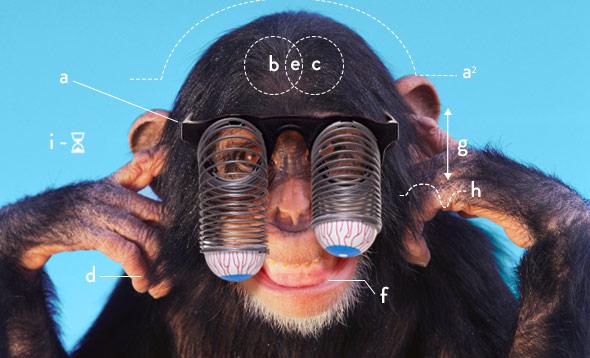Do Other Animals Have A Sense Of Humor
Do animals have a sense of humor? New evidence suggests that all mammals take a funny bone.
Entry 4: Do animals have a sense of humor?

Fuse/iStockphoto, chrisbrignell/iStockphoto. Photo illustration by Natalie Matthews-Ramo.
Right now, in a high-security inquiry lab at Northwestern University'due south Falk Eye for Molecular Therapeutics, scientists are tickling rats. Their goal? To develop a pharmaceutical-class happiness pill. Simply their efforts might also produce some of the best evidence yet that humor isn't something experienced exclusively by human beings.
Scientists believe human laughter evolved from the distinctive panting emitted by our great-ape relatives during crude and tumble play; that panting functions equally a signal that the play is all in practiced fun and nobody'south well-nigh to tear anybody else's throat out. In a clever scrap of scientific detective work, psychologist Marina Davila-Ross of the University of Portsmouth in the United Kingdom analyzed digital recordings of tickle-induced panting from chimps, bonobos, gorillas, and orangutans, as well as human laughter, and found the vocal similarities between the species matched their evolutionary relationships. Chimps and bonobos, our closest relatives, boast the most laughter-like kind of panting, while the noises of gorillas, further down our family tree, audio less like laughing. And orangutans, our truly afar cousins, pant in a well-nigh archaic way.
Nonhuman primates don't just laugh—there's evidence they tin scissure their ain jokes. Koko, a gorilla in Woodside, Calif., who has learned more than 2,000 words and i,000 American Sign Language signs, has been known to play with different meanings of the same word. When she was asked, "What can you think of that'due south hard?" the gorilla signed, "rock" and "work." She also once tied her trainer'south shoelaces together and signed, "chase."
Only what near other members of the animate being kingdom—do they have funny bones? Marc Bekoff, University of Colorado–Bedrock professor of ecology and evolutionary biology and author of The Emotional Lives of Animals, believes they do. In fact, he thinks we're on the cusp of discovering that many animals take a sense of sense of humour, maybe even all mammals. The thought that animals can capeesh comedy isn't every bit far-fetched equally information technology sounds, because some of the other groundbreaking discoveries scientists like Bekoff are making about animal behavior: They accept found dogs that empathise unfairness, spiders that display different temperaments, and bees that tin be trained to be pessimistic.
As Bekoff points out, Darwin argued that the difference between man and animal intelligence is a matter of degree, not of kind. Or as Bekoff put it, "If nosotros accept a sense of humor, then nonhuman animals should take a sense of sense of humour, as well."
A similar sentiment inspired psychologist Jaak Panksepp to enter his lab at Bowling Green State Academy in Ohio one day in 1997 and tell undergrad Jeffrey Burgdorf, "Allow's go tickle some rats." The lab had already discovered that its rats would emit unique ultrasonic chirps in the 50 kilohertz range when they were chasing one another and engaging in play fighting. Now the researchers wondered if they could prompt this chirping through tickling. Certain enough, when the researchers began poking at the bellies of the rats in their lab, their ultrasonic recording devices picked upwards the same 50 kilohertz sounds. The rats eagerly chased their fingers for more. Before long, as the news media trumpeted the beingness of rat laughter, people the world over were opening upward their rat cages and engaging Pinky and Mr. Pickles in total-scale tickle wars.
We met Burgdorf at his function at Northwestern'southward Falk Centre, where as a biomedical engineering professor he's continued his rat-tickling efforts. He was cautious, however, nearly overselling what's happening with his rodents. "I don't necessarily call it laughter, I telephone call it a point of positive affect," Burgdorf told the states. His careful choice of words makes sense. Non everyone was convinced he and Panksepp had uncovered real rat laughter when their rodent-tickling activities start went public. But whatever you want to telephone call it, Burgdorf, a quick-witted guy with a boyish face up and a sign on his office door that reads "Know It All," has been obsessed with that foreign rat noise he start heard in 1997.
He seems to be onto something. While tickling isn't always pleasant—thus the term "tickle torture"—in multiple experiments Burgdorf has demonstrated the rats' 50 kilohertz chirping is only associated with positive experiences. For case, the rats only made this sound during crude and tumble play when the animals were of similar size. The vocalizations changed when one of the animals involved was much larger than the other, when it was no longer fun and games and instead looked more similar bullying. And when given a choice, Burgdorf'due south rats would push a bar to play a recording of the 50 kilohertz chirp equally opposed to other rat noises, suggesting they had a preference for the sound. Finally, when Burgdorf and his colleagues used electrodes, opiates, and other manipulations to stimulate the advantage centers of rats' brains, the rats produced that same laughter-like noise.
Whether yous phone call information technology laughter or non, Burgdorf is convinced these rats' ultrasonic noises signal they're experiencing happiness. Hence the "laughing pill" experiment: He and his colleagues are testing a new antidepressant medication on rats, to see if information technology makes them "express mirth," or chirp happily. If all goes well, Burgdorf believes the resulting medication could somewhen be approved for humans. Rats, so oftentimes seen as a malicious pest, could end upward making the world a happier place.
Next up: Why does every state have a Shine joke?
This series is adapted from The Humor Code: A Global Search for What Makes Things Funny.
Source: https://slate.com/culture/2014/03/do-animals-have-a-sense-of-humor-new-evidence-suggests-that-all-mammals-have-a-funny-bone.html
Posted by: turpinbaxt1992.blogspot.com

0 Response to "Do Other Animals Have A Sense Of Humor"
Post a Comment